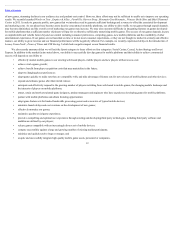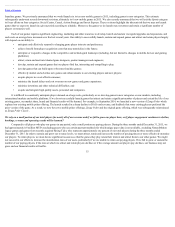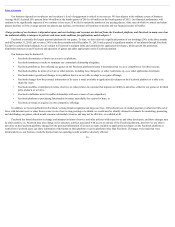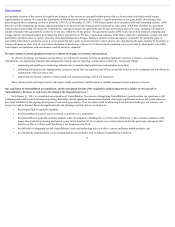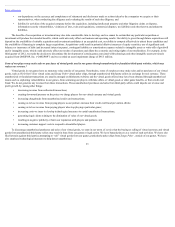Zynga 2015 Annual Report Download - page 18
Download and view the complete annual report
Please find page 18 of the 2015 Zynga annual report below. You can navigate through the pages in the report by either clicking on the pages listed below, or by using the keyword search tool below to find specific information within the annual report.
Table of Contents
franchise games. We previously announced that we would launch six to ten new mobile games in 2015, including games in new categories. This estimate
subsequently underwent several downward revisions, ultimately to 6 new mobile games in 2015. We also recently announced that we will exit the Sports category
to focus efforts on four categories: Social Casino, Casual, Action Strategy and Invest Express. These revisions highlight the inherent risk that we may not launch
games that we expect to launch in a given period according to schedule. Moreover, the games we do launch may not attract and retain a significant number of
players or monetize well.
Each of our games requires significant engineering, marketing and other resources to develop, launch and sustain via regular upgrades and expansions, and
such costs on average have increased over the last several years. Our ability to successfully launch, sustain and expand games and attract and retain players largely
will depend on our ability to:
• anticipate and effectively respond to changing game player interests and preferences;
• achieve benefit from player acquisition costs that may materialize in the future;
• anticipate or respond to changes in the competitive and technological landscape (including, but not limited to changes in mobile devices and gaming
platforms);
• attract, retain and motivate talented game designers, product managers and engineers;
• develop, sustain and expand games that our players find fun, interesting and compelling to play;
• develop games that can build upon or become franchise games;
• effectively market and advertise new games and enhancements to our existing players and new players;
• acquire players in a cost-effective manner;
• minimize the launch delays and cost overruns on new games and game expansions;
• minimize downtime and other technical difficulties; and
• acquire and integrate high quality assets, personnel and companies.
It is difficult to consistently anticipate player demand on a large scale, particularly as we develop games in new categories or new markets, including
international markets and mobile platforms. If we do not successfully launch games that attract and retain a significant number of players and extend the life of our
existing games, our market share, brand and financial results will be harmed. For example, in September 2014, we launched a new version of Zynga Poker which
replaced our existing mobile poker offering. The launch resulted in a sharp decline in DAUs and revenue, and feedback that some existing players preferred the
prior version of the game. As a result, we now have two mobile poker offerings, Zynga Poker and the original game offering, which was subsequently reintroduced
as Zynga Poker Classic .
Werelyonasmallportionofourtotalplayersfornearlyallofourrevenueandifwefailtogrowourplayerbase,orifplayerengagementcontinuestodecline,
bookings,revenueandoperatingresultswillbeharmed.*
Compared to all players who play our games in any period, only a small portion are paying players. During the three months ended December 31, 2015, we
had approximately 0.8 million MUPs (excluding payers who use certain payment methods for which unique payer data is not available, excluding NaturalMotion
legacy games and games from recently acquired Rising Tide), who represent approximately one percent of our total players during the three months ended
December 31, 2015. In order to sustain and grow our revenue levels, we must attract, retain and increase the number of paying players or more effectively monetize
our players. To retain players, we must devote significant resources so that the games they play retain their interest and attract them to our other games. We might
not succeed in our efforts to increase the monetization rates of our users, particularly if we are unable to retain our paying players. If we fail to grow or sustain the
number of our paying players, if the rates at which we attract and retain players declines or if the average amount our players pay declines, our business may not
grow and our financial results will suffer.
15









